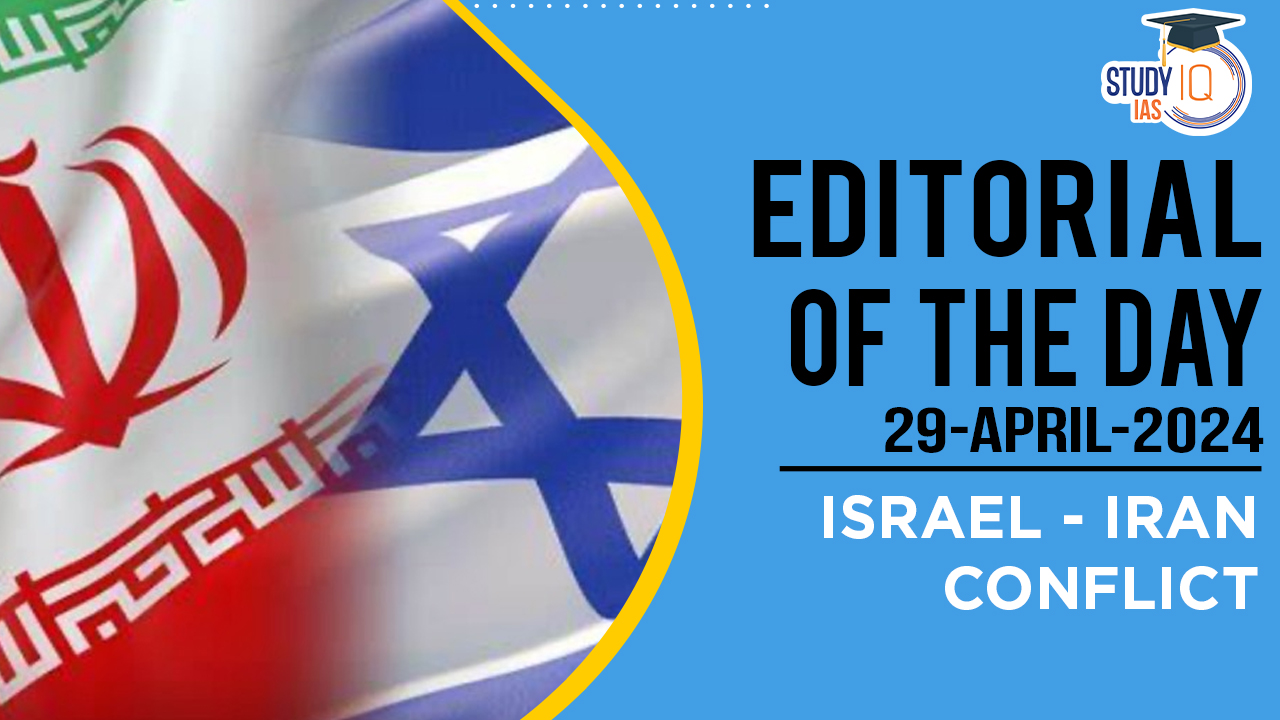Table of Contents
Context: For an extended period, Iran has exercised restraint in its covert conflict with Israel. However, the recent airstrikes by Tel Aviv in Damascus appear to have changed the situation’s dynamics.
Background
- Benjamin Netanyahu, the Israeli Prime Minister, has long considered Iran a major threat to Israel.
- He strongly opposed the 2015 Iran nuclear deal and has taken a hard line against Iranian influence in the region.
- There has been a shadow war between Israel and Iran for years.
- Israel has been carrying out airstrikes in Syria targeting Iranian interests for years, including the assassination of Mohsen Fakhrizadeh, a senior Iranian nuclear scientist, in November 2020.. Iran mostly avoided forceful responses, which emboldened Israel.
What Triggered the War?
- Hamas’s Attack on Israel (October 7): This attack significantly heightened tensions and prompted a strong military response from Israel.
- This incident set a backdrop of heightened alert and military readiness within the region.
- Israeli Bombing of Iranian Embassy Compound in Damascus (April 1, 2024): This attack resulted in the death of senior Revolutionary Guard officers and was a direct provocation to Iran.
- It was a critical moment that escalated tensions significantly, making retaliation by Iran a likely scenario.
- Iran’s Retaliation with a Direct Attack on Israel (April 14): This was a direct response to the Israeli actions in Damascus and marked the first direct state-led assault on Israel in over three decades.
- This attack was significant because it breached Israel’s deterrence and demonstrated Iran’s willingness to engage directly.
U.S. Role
- Preventive Diplomacy: The U.S has been actively working to prevent the Israel-Hamas conflict from escalating into a regional war.
- This includes a balanced approach of supporting Israel’s military operations while simultaneously engaging in diplomatic efforts to maintain regional stability.
- Limited Influence Over Iran: Despite its efforts, the U.S. has limited leverage over Iran, complicating its ability to control the broader regional dynamics.
- Strategic Non-Engagement: The U.S. informed Israel that it would not participate in any retaliatory strikes against Iran, pushing for de-escalation to avoid a regional war.
- This stance reflects a broader U.S. strategy to avoid deep involvement in additional conflicts that could detract from other priorities in Eastern Europe and the Indo-Pacific.
Israel’s Situation
- Increased Vulnerability: The direct attack by Iran on April 14 marked a significant security breach, highlighting vulnerabilities in Israel’s deterrence capabilities.
- Dual Military Fronts: Israel has been engaged in military operations not only in Gaza but also in countering Iranian influence in the region, as evidenced by over 400 airstrikes in Syria targeting Iranian interests.
- Strategic Dilemma: Following the U.S.’s directive to avoid escalation, Israel’s response to the Iranian attack was limited to a symbolic strike, targeting a radar system inside Iran. This restrained response was perceived as weak, potentially undermining Israel’s deterrence further.
Iran’s New Strategy
- Iran’s patience seems to have worn thin after repeated Israeli attacks.
- Iran’s improved relations with Russia and China, and the US’s reluctance for another war, likely emboldened them to strike Israel directly.
- Iran views Israel as weakened by the Gaza conflict and the international criticism it has received.
The New Reality:
- Iran’s attack, despite US intervention, suggests a shift in the regional balance of power.
- This incident marks the third time Iran has launched attacks against US allies (Saudi Arabia and Israel) with minimal consequences.
- This may embolden Iran further in the future.
Additional Impacts
- Global and Regional Implications: These events occur within a complex web of global strategic interests, including U.S. tensions with China and Russia, which indirectly affect the dynamics in West Asia.
- Humanitarian Concerns: The ongoing military actions in Gaza have led to severe humanitarian consequences, complicating Israel’s international standing and inviting legal and diplomatic challenges.


 5 Years of SVAMITVA Scheme and Its Benef...
5 Years of SVAMITVA Scheme and Its Benef...
 Places in News for UPSC 2025 for Prelims...
Places in News for UPSC 2025 for Prelims...
 Countercyclical Capital Buffer (CCyB): P...
Countercyclical Capital Buffer (CCyB): P...





















